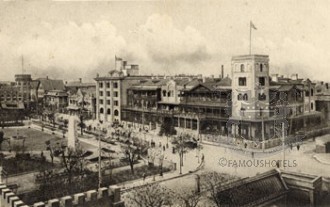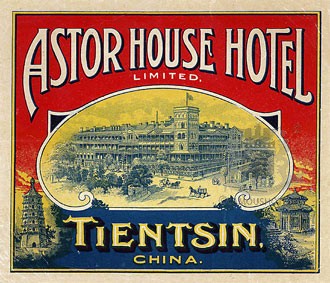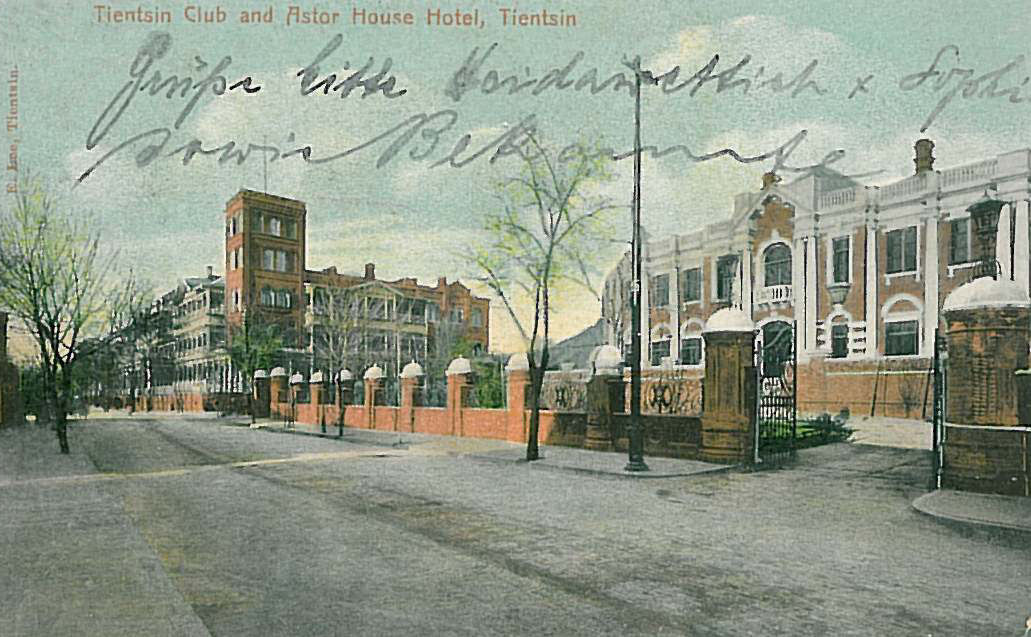

An early view of the Astor House Hotel and Victoria Park. Gordon Hall is just visible in upper left.
Astor Hotel
Herbert Hoover, president of the U.S., and a onetime Tientsin resident during the Boxer rebellion, called Tienstin an universal city, "like a world in miniature with all nationalities, all architectural styles, all kitchens."

Famous for the "Treaty of Tien-tsin" (1858), ending the first part of the Second Opium War, the city developed into a strategic centre of trade. The treaties had opened more Chinese ports to the foreigners, permitted foreign legations in the Chinese capital Beijing, allow Christian missionary activity, and legalised the import of opium. British general Charles “Chinese” Gordon (who would die in Khartoum) laid out the plans for the British concession. The seat of British Administration, or Gordon Hall, named after him, offers a view of Victoria Park where we find the Astor House Hotel.
The hotel dates back to the summer of 1863, when John Innocent, a British Methodist missionary, arrived in Tianjin determined to bring Western-style housing to the city. After a few unsuccessful attempts, two buildings were drawn up. One was a storehouse. Finally he got the permission to build the other, the first international hotel in modern Chinese history, the Astor House Hotel. Construcition started in 1863, the hotel opened for business in 1864.
The "Astor House" became the most famous hotel in the city. G.H. Thomas wrote in 1939: "I arrived in Tienstin Tuesday afternoon and stayed overnight at the Astor House,... (see more in Famous Guests)

Several documents referred as "Treaty of Tien-tsin" were signed in Tianjin (Tientsin) in June 1858, ending the first part of the Second Opium War (1856-1860). France, United Kingdom, Russia, and the United States were the parties involved. These treaties opened more Chinese ports (see Treaty of Nanking) to the foreigners, permitted foreign legations in the Chinese capital Beijing, allow Christian missionary activity, and legalised the import of opium.
The British general Charles “Chinese” Gordon (who would die in Khartoum) laid out the plans for the British concession. The seat of British Administration, or Gordon Hall, named after him, offers a view of Victoria Park where we find the Astor House Hotel.
In the summer of 1863, John Innocent, a British Methodist missionary, arrived in Tianjin determined to bring Western-style housing to the city. After a few unsuccessful attempts, two buildings were drawn up. One was a storehouse and the other, the first international hotel in modern Chinese history, The Astor Hotel.
The name ‘Astor’ was originally derived from three Chinese characters: ‘Li, Shun, De’ which express the Confucian ideals of the ‘power of understanding’ and the ‘power of reason,’ both close to missionary values that were deemed befitting for the hotel.
From the onset in 1863 until the end of the 19th century, the Astor House Hotel became the prime venue for all diplomatic activity in Tianjin, and was soon named one of the first Diplomatic residences in China. The British consulate held most of its meetings there and the American consulate was first established within the hotel and did not relocate until 1929. Hebert Hoover, later 31st President of the United States of America, regularly patronised the hotel during his mission in China with Morling & Co. Additionally, two international treaties were signed at the hotel, the Sino-Denmark Treaty and the Sino-Netherlands treaty, both signed in 1863.
In the summer of 1886, renovation and extension work began on The Astor Hotel as the hotel was brought up to par with the growing needs of the foreign concessions. From a one-story building, the hotel became a three level structure with a veranda and tower facing the park to the west.
Except for a short time during the Boxer Rebellion in 1900 and the period when Tientsin was occupied by the Japanese, from 1938 to 1945, it was under Western control for over eighty years. The concessions presented a remarkable collection of architectural styles from those decades, many examples of which still exist today.
In 1924, a new building emerged, which joined the 1886 building and featured an American Otis elevator. Three decades later, in 1954, a Tibetan committee, including the Living Buddha Apei Awangjinmei, stayed at The Astor Hotel and a special room was organised where the 10th Banchan chanted the Buddhist Sutra.
Today a landmark event and substantial upgrade has led the Tianjin Tourism Group to appoint Starwood Hotels & Resorts to manage this prestigious and historic hotel to revive the legend and restore The Astor Hotel to its prime place as the “Grande Dame of Tianjin”.
G.H. Thomas writes on March 23, 1939:
"I arrived in Tienstin Tuesday afternoon and stayed overnight at the Astor House, and then caught the train for Peking. The train was packed with Japanese officers, and the two-and-a-half hour trip wasn't much fun. Each officer carries swords, pistols, big dispatch cases, field glasses, canteens and other odds and ends in such number that he should have an entire compartment to himself.
The country is so flat and ordinary between Tienstin and Peking that one could almost imagine to be riding across our Midwest plains. The sudden appearance of the great walls of Peking comes as a startling experience, even when they are expected."
Gould Hunter Thomas was a businessman and traveller, born in New York City in 1912 († Connecticut, 1975). After graduating from Yale in 1934 he held several jobs but in 1936, having saved enough money, he set out on a round-the-world trip by ship to broaden his horizons. He intended to stay in China for only several months, but because of a steamship strike ended up staying three years. Hired by Texaco in Shanghai, he sold oil for the lamps of China.
Gordon
The British general Charles “Chinese” Gordon (who would die in Khartoum) laid out the plans for the British concession. Herbert Hoover, president of the U.S., was a short-time Tientsin resident during the Boxer Rebellion
Famous Westerners born in Tienstin include Eric Liddel, the runner and missionary, and John Hersey, the novelist, whose parents were missionaries there.
Except for a short time during the Boxer Rebellion in 1900 and the period when Tientsin was occupied by the Japanese, from 1938 to 1945, it was under Western control for over eighty years. The concessions presented a remarkable collection of architectural styles from those decades, many examples of which still exist today.
A vibrant commecial street that traversed the various concessions was named according to the nationality of the concession, thus Victoria Street became the Rue de France, Kaiser Wilhelm Strasse or Woodrow Wilson Road, depending on which concession it was in.
Herbert Hoover, president of the U.S., and a onetime Tientsin resident during the Boxer Rebellion, wrote in his memoirs: "Tienstin is a universal city, like a world in miniature with all nationalities, all architectural styles, all kitchens."
Famous Westerners born in Tienstin include Eric Liddel, the runner and missionary, and John Hersey, the novelist, whose parents were missionaries there.
Rooms